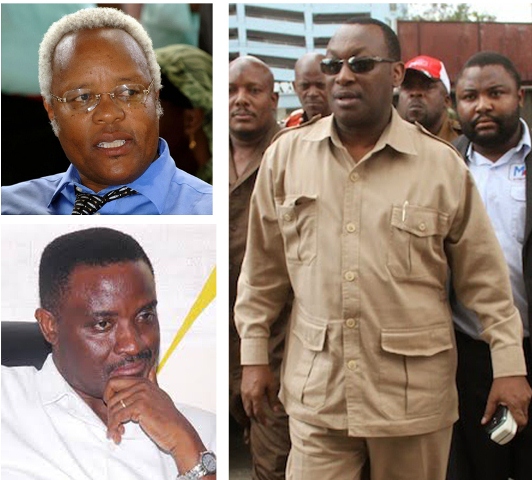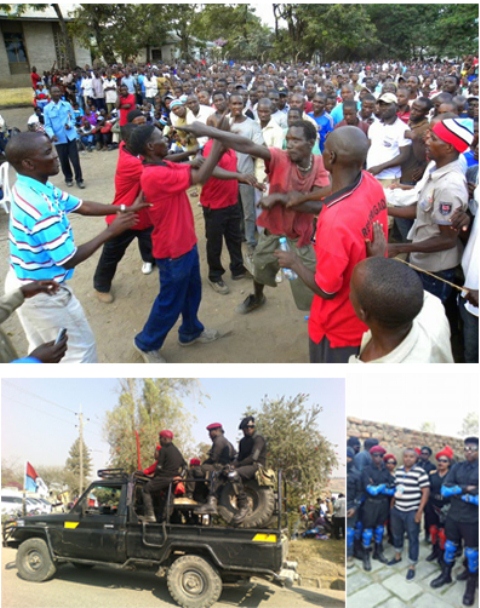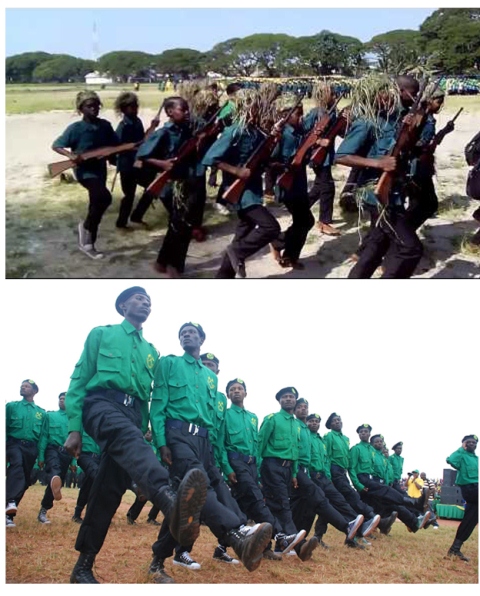Concern based on existence of militia groups in all major political parties which might clash after announcement of presidential winners in Union Government and Zanzibar 2015 general elections….

Top Left: Chadema Presidential Candidate Edward Ngoyai Lowassa. Botton Left: Chadema Director of Intelligence and Security Wilfred Lwakatare. Right: CHADEMA Chairman Freeman Aikaeli Mbowe (Internet Photos).
By TZ Business News Special Correspondent
Proceedings in a confidential meeting reported to have taken place at headquarters of Chama cha Demokrasia na Maendeleo (CHADEMA), Tanzania’s leading opposition political Party, on July 27, 2015 has sent jitters in the corridors of state security organs in the country.
The July meeting is the main reason security organs are concerned there will be unrest after the October 25 general elections if the CHADEMA presidential candidate Edward Ngoyai Lowassa is not declared winner.
The fear arises from the understanding all major political parties have militia wings which could clash in the aftermath of the announcement of the presidential winner.
Information which has not been verified independently, but which TZ Business News believes to be accurate asserts that on July 27, 2015 Edward Ngoyai Lowassa, the presidential candidate from the National Coalition for a New Constitution (UKAWA) fielded by CHADEMA, held a meeting with his new party chairman Freeman Aikaeli Mbowe at the party’s headquarters. The party’s security personnel were also present at this meeting.
Lowassa joined CHADEMA after losing his bid to be nominated presidential candidate for the ruling Chama Cha Mapinduzi CCM party in June this year.
A State security source told this TZ Business News Correspondent that at the July meeting, Lowassa asked the party leadership for information on the exact number of ‘Red Brigades’ the party has across the country. The source quotes the CHADEMA Chairman as telling Lowassa the party has “not less than 200” Red Brigades in every Region on mainland Tanzania–which brings the total number of Red Brigades in the country’s 30 regions to ‘not less than 6000’.
The quote above derives from the Kiswahili report: Mwenyekiti FREEMAN MBOWE alimweleza [Lowassa] kuwa wanacho kikosi kikubwa ambacho wengi wao wamewahi kupitia Mgambo, Jeshi la Kujenga Taifa na Askari Wastaafu; Kwamba kila mkoa una Walinzi wasiopungua 200.
The CHADEMA Red Brigades comprise of civilians who have taken military training through the People’s Militia program, the National Service program, and retired combat military personnel, the source quotes Mbowe as saying.

Above: Members of the Chadema Red Brigade demonstrate military skills in Mwanza. Bottom: Members of the Red Brigade on duty in Mbeya city during the 2015 presidential campaigns.
At this point, Lowassa is reported to have said he will not concede defeat under any circumstance if he is declared loser in the October general election, and that he will ask Seif Shariff Hamad who is running as presidential candidate in Zanzibar, to also refuse to concede if he is declared loser in Zanzibar. Lowassa reportedly told Mbowe and the others attending the confidential meeting his wish is that the outgoing President Jakaya Mrisho Kikwete hands to him a country that is peaceful after the October general elections.
The presidential candidate then reportedly asked the party chairman to consider mobilizing the Red Brigades to defy any announcement of defeat in the four mainland regions of Arusha, D’Salaam, Mbeya and Mwanza.
This correspondent’s effort to get comment from Lowassa and the CHADEMA chairman on this matter were not successful. However, the CHADEMA Deputy Secretary General for Zanzibar, Salum Mwalimu said his party received a letter instructing them to disband the Red Brigade, but that the directive lacks of substance because the group is constitutional.
The Registrar of Political parties, Francis Mutungi issued a directive earlier ordering political parties to disband their military groups, threatening to de-register any political parties which did not abide by this order. The CHADEMA Deputy Secretary General for Zanzibar said his party had a meeting with election stakeholders which discussed how to maintain peace during the election and they discussed the registrar’s ban.
“We agreed that we should meet with the police and NEC to discuss and I hope the ban will be removed because the group is at the best interest of the party and the community as we help the police in their duty of protecting peoples properties,” he said.
The Red Brigade formation is stipulated in the Chadema constitution clause 7.7.5 which says “There shall be a defense [group] to protect properties, leaders and party interests named Red Brigade.” The party’s constitution was submitted and accepted by the country’s registrar of political parties as a pre-condition for party registration.
The main opposition party in Zanzibar, Chama cha Wananchi (CUF), also mentions protecting party interests through security arrangement. Sections 76(1) through 78(2)d permits the formation of a party committee in charge of security. The constitution does not give this committee a name, although informally this committee has been given the name ‘Blue Guards’. This party’s constitution was also submitted and accepted by the country’s registrar of political parties as a pre-condition for party registration.
The ruling Chama Cha Mapinduzi (CCM), on the other hand, has party security operatives who work through an arrangement that is rather elaborate, but not identified in the party constitution, and which is known to conduct covert operations after military training in the bush and ideological training in the open. The CCM security group is informally known as Green Guards. However, the CCM publicity and ideology secretary Nape Nnauye told this correspndent his party has nothing called Green Guards.
In explaining, Nnauye said what CCM have are groups of youth aged 13 years and below who are taught party ideology and physical fitness while all security matters of the party are taken care of by the police. He said the term Green Guard has been ‘created’ by the opposition in order to justify existence of their own groups.
But several assaults against followers of the opposition are known to have been perpetrated by CCM youths clad in Green shirts and black trousers referred to by the media as Green Guards.
The most recent incident allegedly involving Green Guards was in June this year when the CCM presidential aspirant Dr Mussa Kalokola was assaulted after he encroached into a meeting of another aspirant of the same party, Edward Ngoyai Lowassa in Tanga. Lowassa jumped to the opposition when he was not nominated to be the CCM presidential candidate.
State security organs are concerned the political parties’ militia activities pose a threat to peace and tranquilty during this year’s elections. Chadema has not less thant 6000 Red Brigades countrywide poised to protect party leaders. Analysis would indicate CCM has a significant number of Green Guards across the country, while CUF is understood to have a good number of Blue Guards—particulary in Zanzibar.
Red Brigades clad in quasi-military regalia were last time spotted in the southern city of Mbeya on August 14 when the UKAWA presidential candidate toured the city. Four days later, the Mbeya Regional Police Commander, Ahmed Msangi sounded an alarm calling for the youths to surrender themselves to the police for interrogation and possible prosecution over ‘encroaching into police mandate.’
The Tanzania Police Commissioner for Operations and Training Paul Chagonja has warned political parties against the use of defense groups saying the responsibility of guarding party’s gatherings and activities should strictly be left to the police.
“Stern measures will be taken against any political party that will defy this order,” he said, adding that prior to any rally a party must notify the police at least 48 hours in advance, in order to give the police the opportunity to deploy officers to guard the meetings.

Green Guards Versus Red Brigade: scuffle errupts during a by-election in Tabora region two years ago.
Dr Helen Kijo-Bisimba, Executive Director of Legal and Human Rights Centre (LHRC) says it is proper for political parties to have private guards provided they do not take charge of the police mandate during public rallies. “They can serve [internally]; like one can have private guards at his residence,” she said.
The Registrar of Political Parties, Judge Francis Mutungi, has advised that in order to peacefully resolve this matter, the National Electoral Commission (NEC), the police and political parties should sit together and discuss the issue.
The constitution of the United Republic of Tanzania clause 147(1) says it is the preserve of the government to form and operate any group of people for the purpose of taking charge of security. But there are more than 700 private security companies, which are registered under the Companies Ordinance and licensed by the Ministry of Home Affairs.




